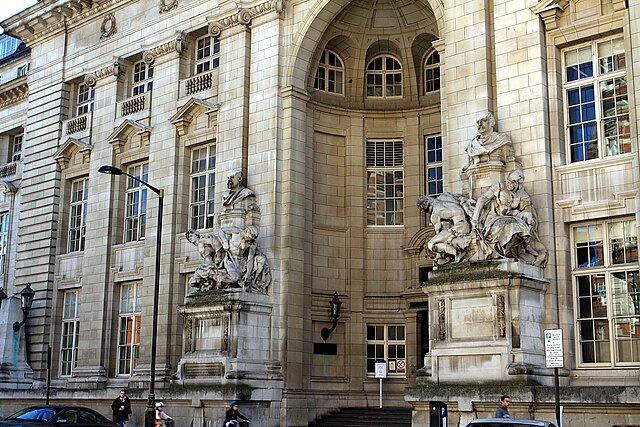As Thammasat University students grow accustomed to online learning and distance education, some may wish to explore overseas opportunities after they have done their required coursework. Taking an extra class may be informative and help complement main areas of study, giving students new ideas and perspectives and help them to practice their English language usage.
One opportunity to consider may be free massive open online courses (MOOCs) at the Imperial College London, United Kingdom.
Imperial College London, officially called the Imperial College of Science, Technology and Medicine, is a public research university originally founded in 1845.
The college focuses exclusively on science, technology, medicine and business.
The Thammasat University Library collection includes a number of books published by the Imperial College Press, a distinguished academic publisher.
These include Advances in multiphysics simulation and experimental testing of MEMS edited by Attilio Frangi et al.; The anthropology of China : China as ethnographic and theoretical critique by Charlotte Bruckermann and Stephan Feuchtwang; Applied analysis: mathematical methods in natural science by Takashi Suzuki and Takasi Senba; The applied genetics of humans, animals, plants, and fungi by Bernard C. Lamb; Basic chemical thermodynamics by E. Brian Smith; Bioanalytical chemistry by Andreas Manz; Biocatalysis: biochemical fundamentals and applications by Peter Grunwald; Biology of wastewater treatment by N.F. Gray; Black holes: an introduction by Derek Raine and Edwin Thomas; Catalysis by gold by Geoffrey C. Bond, Catherine Louis, and David T. Thompson; Catching up and falling behind: post-communist transformation in historical perspective by David A. Dyker; and Climate change and energy: Japanese perspectives on climate change mitigation strategy by Yoichi Kaya, Kenji Yamaji, and Keigo Akimoto, among many others.
Insofar as Imperial College London is a community of problem-solvers dedicated to finding innovative solutions to the world’s biggest challenges, TU students may find a virtual visit inspiring to this multidisciplinary space for education, research, translation and commercialisation, harnessing science and innovation to tackle global challenges.

Among MOOCS available is Why Move Towards Cleaner Power. The class description reads:
Learn why we need to clean up our power supply, and why is it urgent that we take action now. Gain the tools you need to present arguments in favour of a cleaner power sector in your part of the world.
About this course
This course looks at how increasing greenhouse gases are warming the climate and what it means to decarbonise – reduce the greenhouse gas intensity of – the power sector. It will also provide a range of arguments in favour of decarbonisation, including consideration of ease of access to a secure and affordable energy supply and improvements to health and the environment.
This course gathers together information about these different motivating factors for building a lower carbon power sector in one place, and includes a careful consideration of the importance of the political context. This course will challenge you to critically analyse your own political context.
We would welcome advisors to senior decision makers in government, civil society activists and others interested in understanding and promoting renewable electricity to take this course. This course will help you develop a better understanding of the different dimensions of a move towards a cleaner power sector and develop more nuanced and detailed arguments.
What you’ll learn
- Improved understanding of the key drivers behind decarbonising the economy in general and the power sector in particular; including an understanding of the advantages and disadvantages of action
- Empowerment to make decisions and develop policies that deliver a low-carbon power system that is relevant to their local context.
- Enabling presentation of the arguments in favour of their approach confidently, and relevant to their local circumstances.
- Preparation for a more detailed course on the policies needed to support a low-carbon power sector.
Among instructors are Professor Joanna Haigh; Professor Richard Green; and Dr. Kris Murray, all of the Imperial College London.

Another class of possible interest for a wide range of TU students might be Creative Thinking: Techniques and Tools for Success.
Its description follows:
Learn how to apply tools and techniques to better solve problems, generate ideas, and excel in your chosen career.
About this course
In today’s ever-growing and changing world, being able to think creatively and innovatively are essential skills. It can sometimes be challenging to step back and reflect in an environment which is fast paced or when you are required to assimilate large amounts of information. Making sense of or communicating new ideas in an innovative and engaging way, approaching problems from fresh angles, and producing novel solutions are all traits which are highly sought after by employers.
The greatest innovators aren’t necessarily the people who have the most original idea. Often, they are people- or teams- that have harnessed their creativity to develop a new perspective or more effective way of communicating an idea. You can train your imagination to seize opportunities, break away from routine and habit, and tap into your natural creativity.
This course will equip you with a ‘tool-box’, introducing you to a selection of behaviours and techniques that will augment your innate creativity. Some of the tools are suited to use on your own and others work well for a group, enabling you to leverage the power of several minds.
The practical approach of this course enables you to acquire an essential skill-set for generating ideas, with plenty of:
Fun e-tivities and exercises;
Practical lectures and tips;
Video representations of the techniques in action.
You can pick and choose which of these tools or techniques suit your needs and interests, focusing on some or all of the selected approaches and in the order that fits best for you.
Whatever you’re doing, whether it’s work or leisure, if you practice spending time applying these tools to anything you see or imagine, they will help you get into the habit of making space for observation and imagination. No previous knowledge is needed.
Join this course and our community of practioners in CREATIVITY!
We look forward to seeing you online!
What you’ll learn
- Understand what creative thinking techniques are
- Comprehend their importance in tackling global challenges as well as in everyday problem-solving scenarios
- Apply different brainstorming techniques in group activities
- Be proficient in the application of the 6 thinking hats tool in different life scenarios
- Develop a systematic approach to idea generation through the use of morphological analysis
- Innovate on an existing product, service or situation applying the SCAMPER method
- Get confident with the theory of inventive problem solving, called TRIZ
- Select and apply the appropriate technique based on the opportunity to seize or the problem to tackle
The class will be taught by Professor Peter Childs, Head of the Dyson School of Design Engineering and Professorial Lead in Engineering Design, Imperial College London. Professor Childs’ general interests include: creativity; the application of creativity tools; mechanical and product design; robotics; rotating flow, temperature and its measurement, sustainable energy component, concept and system design.
Still another possibility would be Coaching Skills for Learner-Centred Conversations:
Using coaching approaches in your educational conversations will help you support learners to really maximise their potential, as you become an even more effective and inspiring educator. Over these next four modules, you will become much more familiar with some key coaching principles and skills, and will be equipped to start applying these in your own educational contexts.
About this course
This interactive course will introduce you to coaching skills for learner-centred conversations. As well as learning about and practicing these skills, you will have the opportunity to reflect on how you can use and integrate these skills into your own educational contexts. The modules will cover:
- Key principles of coaching approaches in education
- Creating the conditions needed for an effective learning relationship
- Applying coaching approaches to conversations with learners
- Using coaching approaches in feedback conversations
What you’ll learn
By the end of this course you will be able to:
- To understand and apply the key principles of the coaching approach in education.
- To create the conditions needed for an effective learning relationship
- To analyse the components of a coaching framework and apply this effectively to learning conversations
The class will be taught by Dr. Arti Maini, Coaching lead for the Medical Education Innovation & Research Centre (MEdIC), Imperial College London.

(All images courtesy of Wikimedia Commons)

